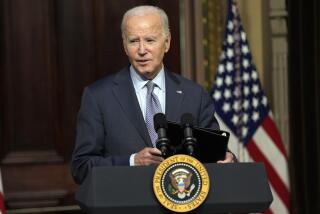‘Sustainable Development’ May Mean Arrested Development for Economy
- Share via
It seems to be inevitable that economists play the role of the heavy who brings the wet blanket to the party. That, sadly, is the case of the newest buzzword in public policy--”sustainable development.” Who in his right mind would advocate unsustainable development?
A recent report of a private blue-ribbon commission of distinguished citizens, “Choosing a Sustainable Future,” states boldly that “U.S. leadership should be based on the concept of sustainable development.” The National Commission on Environment (which is sponsored by the World Wildlife Fund) suggests a grand reconciliation of economic concerns and the environment via a most attractive “new synthesis”: broad-based economic progress should be accomplished in a manner that protects and restores the quality of the natural environment, improves the quality of life for individuals and broadens the prospects for future generations.
How can we quarrel with all of those good things, especially when we are told that all it will take to achieve them is wise decision making and technological advances? For starters, some economists are skeptical because we have learned that, in a world of finite resources, life is full of difficult choices. It’s rarely a question of either/or, but rather of a little more of this and a little less of that. The idea that we can have more of everything is a notion that most of us abandoned with childhood.
Moreover, the notion of sustainability does not sound as good as it seems at first when it is applied to economic development. By its very nature, the growth of an economy is a dynamic process, replete with periods of rapid expansion alternating with slowdown or decline. The most well-meaning attempt to force that inherently unpredictable activity into a neat formation will result, albeit unwittingly, in placing a straitjacket on economic progress.
If a given direction of economic expansion is “unsustainable,” a different course will emerge. The process is guided by changes in relative prices of different resources. Yes, the marketplace works. That is precisely how U.S. demand for illumination progressively shifted from wood to whale oil to kerosene to electricity--without exhausting any of those sources.
The supporters of the sustainable-development notion show some familiarity with economic concepts, but their application is disillusioning. For example, the National Commission on Environment states: “The most efficient way to achieve environmental progress, therefore, is to harness market forces.” Before jumping with joy, it is necessary to read what follows. The most important point is the one that is treated in only the most general way in the report--many governmental regulatory efforts interfere with market forces. On the contrary, the commission urges the use of subsidies, along with taxes, to ensure that prices reflect environmental costs.
The case for environmental taxes in lieu of environmental regulation is well-known and has considerable professional support. But a subsidy is a wedge between the cost of production and the price to the consumer. Hence, subsidies do not encourage market forces; they contravene them.
When environmental enthusiasts attempt to show how easy it is to have both a strong economy and a healthy environment, they expect all of the compromise to come from the concern with employment, growth and other economic considerations. Economists may properly be criticized for being “green eye-shade” types (on reflection, I like the color) but the profession trains us to think of trade-offs between important, desirable objectives. Thus, economists do not take the polar alternative of urging that all compromises be made by environmentalists. That makes it difficult to find a reasonable middle ground with those who cannot distinguish between reasonable compromises and “sellouts.”
While we are trying to search for that high middle ground, we should acknowledge that there surely are occasions when economic efficiency and environmental concerns can go hand in hand. Virtually every study of water-pollution controls shows that a system of economic incentives such as pollution fees (yes, granting a “license to pollute”) would generate a cleaner environment at the same cost as traditional command-and-control systems.
It does not take too much imagination to note that under these circumstances, it should be possible to get a somewhat cleaner environment than under the status quo at a somewhat lower cost--by splitting the benefits of shifting from arbitrary regulation to economic incentives.
But we only set ourselves up for disappointment, and worse, by injecting large doses of wishful thinking into national policies. Overstating ecological or economic threats and risks provides no contribution. Conversely, lowering the decibel level of the public debate surely will help.
More to Read
Get the L.A. Times Politics newsletter
Deeply reported insights into legislation, politics and policy from Sacramento, Washington and beyond. In your inbox twice per week.
You may occasionally receive promotional content from the Los Angeles Times.










